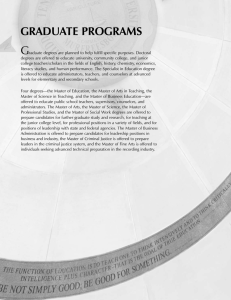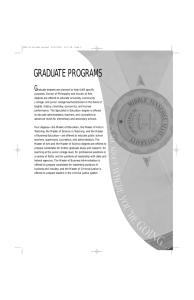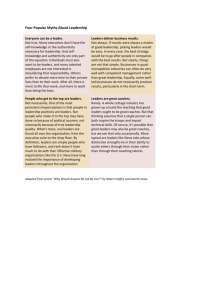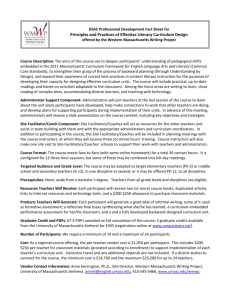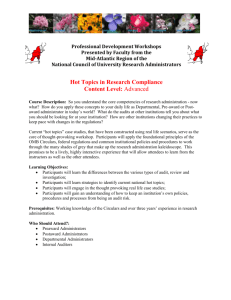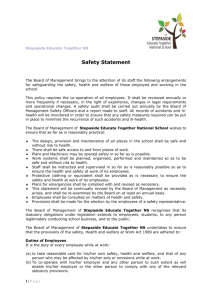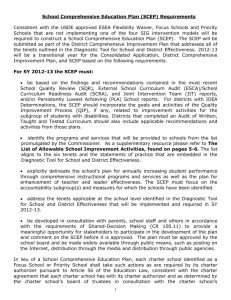Race to Nowhere Suggestions - Scarsdale Union Free School District
advertisement
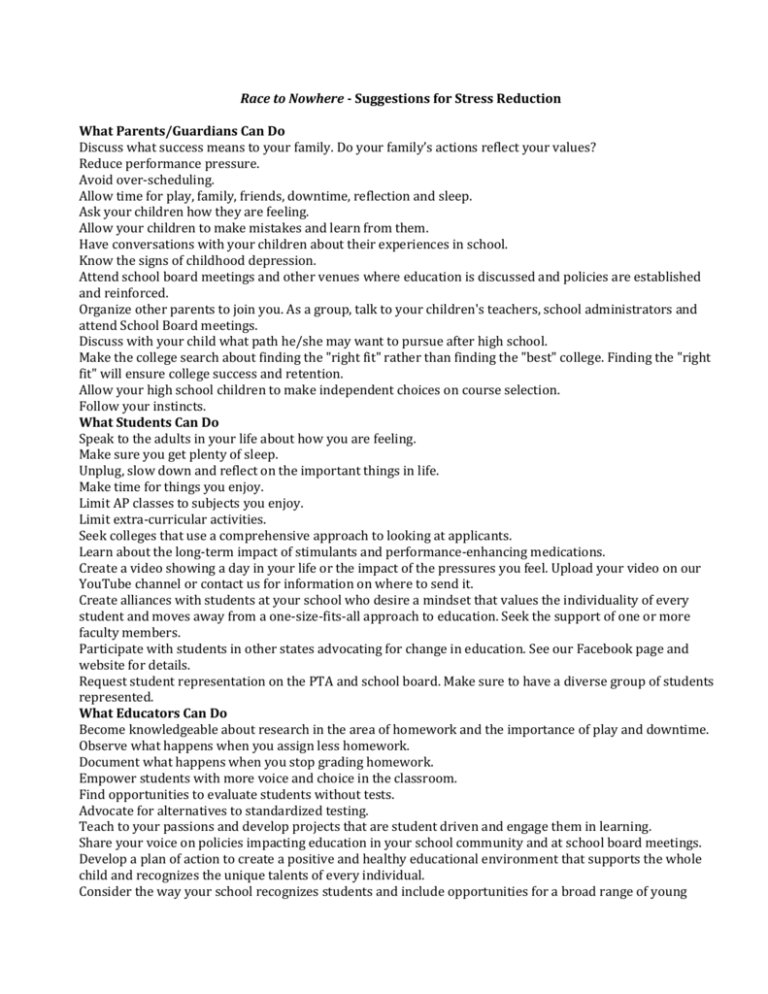
Race to Nowhere - Suggestions for Stress Reduction What Parents/Guardians Can Do Discuss what success means to your family. Do your family’s actions reflect your values? Reduce performance pressure. Avoid over-scheduling. Allow time for play, family, friends, downtime, reflection and sleep. Ask your children how they are feeling. Allow your children to make mistakes and learn from them. Have conversations with your children about their experiences in school. Know the signs of childhood depression. Attend school board meetings and other venues where education is discussed and policies are established and reinforced. Organize other parents to join you. As a group, talk to your children's teachers, school administrators and attend School Board meetings. Discuss with your child what path he/she may want to pursue after high school. Make the college search about finding the "right fit" rather than finding the "best" college. Finding the "right fit" will ensure college success and retention. Allow your high school children to make independent choices on course selection. Follow your instincts. What Students Can Do Speak to the adults in your life about how you are feeling. Make sure you get plenty of sleep. Unplug, slow down and reflect on the important things in life. Make time for things you enjoy. Limit AP classes to subjects you enjoy. Limit extra-curricular activities. Seek colleges that use a comprehensive approach to looking at applicants. Learn about the long-term impact of stimulants and performance-enhancing medications. Create a video showing a day in your life or the impact of the pressures you feel. Upload your video on our YouTube channel or contact us for information on where to send it. Create alliances with students at your school who desire a mindset that values the individuality of every student and moves away from a one-size-fits-all approach to education. Seek the support of one or more faculty members. Participate with students in other states advocating for change in education. See our Facebook page and website for details. Request student representation on the PTA and school board. Make sure to have a diverse group of students represented. What Educators Can Do Become knowledgeable about research in the area of homework and the importance of play and downtime. Observe what happens when you assign less homework. Document what happens when you stop grading homework. Empower students with more voice and choice in the classroom. Find opportunities to evaluate students without tests. Advocate for alternatives to standardized testing. Teach to your passions and develop projects that are student driven and engage them in learning. Share your voice on policies impacting education in your school community and at school board meetings. Develop a plan of action to create a positive and healthy educational environment that supports the whole child and recognizes the unique talents of every individual. Consider the way your school recognizes students and include opportunities for a broad range of young people to be recognized. What Administrators Can Do Develop a plan of action to create a positive and healthy educational environment that supports the whole child. Remember learning should always be joyful and enhance life. Advocate for students. Listen to their needs and react accordingly. Be inclusive and address the diverse needs of your students. Support "multiple pathways" in school integrating academics with career and technical education. Consider a later start time for the school day in high school. Address sources of stress for children, educators and families. Set expectations with faculty at the beginning of the year: e.g., if homework takes longer than a set amount of time, the student should not continue to the point of frustration and should not suffer any consequences at school. Make sure that elementary school students have recess and older students have time for lunch. Create a homework task force to adopt policies and practices that are based on the research. Assign someone to ensure policies are followed. Consider making homework the exception rather than the rule. Consider the way your school recognizes students and include opportunities for a broad range of young people to be recognized. Consider how your school shares information with the media around test scores and college admissions and the unspoken message to students when this information is shared with the media. Consider block schedules to reduce the number of transitions and contacts for students and teachers. Re-think AP programs. Work closely with college admissions offices to share how your students are evaluated. Ensure that school websites are focused on school communications rather than grades. Create calendars to reduce overlapping demands and establish guidelines for tests and projects immediately prior to or after holiday breaks. Provide opportunities for open communication between teachers, parents and students. Create a vision for change with the emphasis being on engaged learning and supporting the whole child rather than teaching to a test. What Coaches Can Do Check out the positive coaching alliance at http://www.positivecoach.org/ Become aware of demands on your athletes from academics, other activities and sports. Become aware of what is developmentally appropriate—physically, socially, cognitively and emotionally— for the age group you are working with. Become aware of your athletes’ academic load. Consider flexibility around missed practices where young people and their families are navigating multiple demands. Work with school administrators and other schools in your leagues to encourage limitations on the number of hours each week for practice and games. Create opportunities for open communication between coaches, teachers, parents, students and the administrators in your school or district. What Medical Professionals Can Do Recognize the signs of youth stress: headaches, stomachaches, dizziness, chest pain and change in appetite and sleeping patterns. Educate parents on the signs of depression in adolescents. Educate young people on the medical implications of the use of stimulants and performance enhancing medications. Educate parents, coaches and young people on the risk of over-use injuries. Educate everyone on the importance of schools maintaining physical education classes and recess and the dangers of too much sedentary time spent at a desk or computer.
